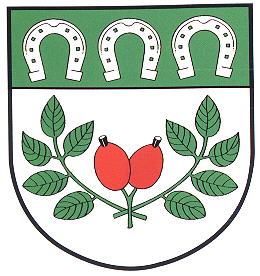Haby: Difference between revisions
Knorrepoes (talk | contribs) m (Text replacement - "{{de1}}" to "{{de}}") |
Knorrepoes (talk | contribs) m (Text replacement - "{{media1}}" to "{{media}}") |
||
| Line 27: | Line 27: | ||
{{de}} | {{de}} | ||
{{ | {{media}} | ||
[[Civic Heraldry Literature - Germany|'''Literature''']]: Reissmann, 1997 | [[Civic Heraldry Literature - Germany|'''Literature''']]: Reissmann, 1997 | ||
Revision as of 06:31, 4 August 2023
HABY
State : Schleswig-Holstein
District (Kreis) : Rendsburg-Eckernförde
Amt : Amt Hüttener Berge (until 2008 Amt Wittensee)
| German |
Unter grünem Schildhaupt, darin drei silberne Hufeisen mit nach unten gekehrten Stollen, in Silber drei fächerförmig gestellte, an ihren Enden gekreuzte grüne Stengel der Wildrose, von denen der mittlere zwei rote Hagebutten, die beiden äußeren jeweils fünf grüne Blätter tragen. |
| English | blazon wanted |
Origin/meaning
The arms were officially granted on January 24, 1992.
The three horse-shoes symbolise the agricultural character of the village. They indicate the importance of horses for working the fields, as well as the local smithies, which produced these horse-shoes.The lower part shows two rosehip branches. They are a canting symbol for the name of the village. Although the name has a different origin, it was thought for a long time that it was derived from Hagebutte-village, or rosehip-village. As wild roses are very common in the region, it was decided to add the branches in the lower half of the shield. The green colour of he chief symbolises agriculture and nature, whereas the silver in the lower half symbolises the Wittensee (white-lake) in the municipality.
This page is part of the German heraldry portal Deutsche Wappensammlung |
Heraldry of the World |
|
German heraldry:
|
Selected collector's items from Germany:
|
Contact and Support
Partners:
Your logo here ?
Contact us
© since 1995, Heraldry of the World, Ralf Hartemink 
Index of the site
Literature: Reissmann, 1997












